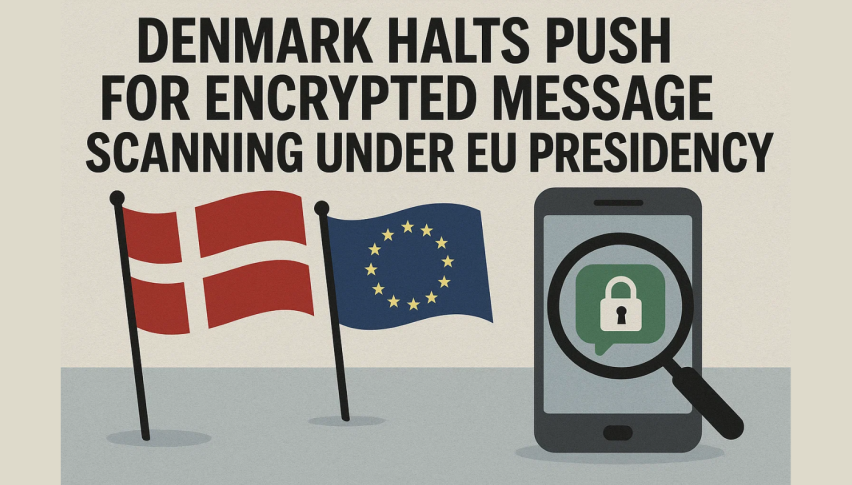Denmark Halts Push for Encrypted Message Scanning Under EU Presidency
Denmark, which now holds the European Council chair, has apparently dropped a proposal that required services such as Telegram...

Quick overview
- Denmark has dropped a controversial proposal requiring messaging services to allow authorities to examine messages before encryption.
- The legislation, known as Chat Control, faced criticism for potentially undermining privacy rights and encrypted communication.
- Justice Minister Peter Hummelgaard emphasized a shift towards maintaining a voluntary framework for message screening, set to expire in April 2026.
- The decision is seen as a victory for digital freedoms, with advocates urging lawmakers to abandon mass surveillance efforts in favor of protecting individual rights.
Denmark, which now holds the European Council chair, has apparently dropped a proposal that required services such as Telegram, WhatsApp, and Signal to allow authorities to examine messages before they were encrypted and sent.
The proposed legislation, called as Chat Control, was first submitted in May 2022 to tackle the proliferation of illicit and illegal content via messaging systems.
A renewed version of it surfaced this year, with detractors claiming that it would damage encrypted messaging and people’s right to privacy.
The plan has been dropped, which means it will still be voluntary.
According to a report by Danish daily newspaper Politiken on Oct. 30, Minister of Justice Peter Hummelgaard indicated that the plan for digital firms to screen encrypted messages will now “not be part of the EU presidency’s new compromise proposal, and that it remains to be voluntary,”
Denmark’s Justice Minister, said the focus is going to turn to sustaining the present voluntary framework, which is set to expire in April 2026. This shift reflects the internal EU discussion over striking a balance between security requirements and protecting citizens’ privacy and safe communication routes.
According to Politiken, Hummelgaard claimed that if the years-long political standoff on Chat Control is not resolved, the EU will be left with no legal instruments to combat criminal actors utilizing message networks.
The reversal on conversation control was purportedly intended to ensure that a new framework could be installed before the deadline.
Tech giants and privacy campaigners celebrate.
On Saturday, X’s Global Government Affairs team stated that Denmark’s departure is a significant setback for mass surveillance proponents, and that the platform will continue to follow the development of these negotiations and resist any efforts to establish government mass surveillance of users.
Privacy Win in EU: Denmark Drops Mandatory Chat Control in CSAM Fight
Danish Justice Minister Peter Hummelgaard announced Thursday that the EU Council Presidency will abandon mandatory detection orders in the Child Sexual Abuse Material (CSAM) proposal—marking a major defeat for…
— Global Government Affairs (@GlobalAffairs) October 31, 2025
Circle’s EU Strategy Director, Patrick Hansen, described it as a “key win for digital freedoms in Europe.” The Electronic Frntier Foundation (EFF) backed this viewpoint, claiming that public pressure was important in halting the legislation’s advancement. This withdrawal strengthens the view that private rights should be protected, especially when addressing illegal content.
Lawmakers must give up on widespread surveillance.
Thorin Klosowski, an EFF security and privacy activist, wrote in a blog post on Friday that lawmakers should cease attempting to defeat encryption in the name of public safety.
He contends that the emphasis should be on establishing actual solutions that do not infringe the human rights of people all over the world.
He stated that as long as parliamentarians continue to comprehend how encryption technology works, there would be no progress with message-scanning plans, whether in the EU or elsewhere.
“This type of surveillance is more than just an overreach; it is an assault on basic human rights. The incoming EU presidents should cease these efforts and focus on finding a solution that safeguards people’s privacy and security.”
Denmark Sets Privacy Benchmark as Ireland Prepares for EU Council Presidency
Denmark’s decision to choose privacy above widespread surveillance could serve as a model for other countries. Denmark has set a paradigm for balancing security requirements with the protection of individual liberties by prioritizing voluntary participation over mandatory scanning. Other countries can develop similar regulatory regimes that prioritize openness and consumer privacy while still addressing concerns about unlawful content.
Ireland will take over the EU Council presidency in July 2026, succeeding Denmark after a year.
- Check out our free forex signals
- Follow the top economic events on FX Leaders economic calendar
- Trade better, discover more Forex Trading Strategies
- Open a FREE Trading Account
- Read our latest reviews on: Avatrade, Exness, HFM and XM
